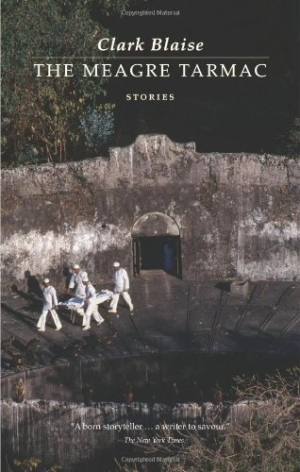The Meagre Tarmac
Very early in Clark Blaise’s new collection, a sociology graduate student sits in Vivek Waldekar’s California kitchen and blurts the purpose of her research: “the problems of adjustment and assimilation” for successful South Asian immigrants, who even Waldekar regards as “sociological anomalies.”
In all eleven stories, Blaise’s characters, mostly men, are attracted and repelled by that same inquiry, and, in the author’s careful hands, the reader comes to know an assortment of possible responses, but no definitive answers.
Blaise’s stories illuminate the Indo-American experience of superficially successful immigrants who are haunted by belief systems and familial expectations that don’t penetrate borders. Even his most seemingly independent, North Americanized adult characters eventually arrive at an internal mandate to fill, or at least confront, the chasm left by leaving Indian culture and homeland. In the process marriages are splintered, careers jeopardized, children held tightly or freed, fortunes displaced, old obligations putatively revisited, lives examined.
A few stories are linked, and several protagonists make repeat appearances, both expected and serendipitously. After Waldekar’s prominence in the first three stories he is missed, but only briefly, as Blaise’s other main characters intrigue and beckon with divergent lives, all atop a shared geyser of self-doubt.
For the American or Canadian reader (the author has lived in both countries and three stories cross borders, too), Blaise’s insider stance is drawn from a unique perch: married for nearly four decades to Indian-born American novelist Bharati Mukherjee, with whom he co-authored Days and Nights in Calcutta, chronicling their year in India. His understanding of the Indo-American experience is likely heightened by this outsider-insider status; and while it’s presumptive for a non-Indian to declare he “gets it right,” his prose is underscored with a deft, sure-footedness that reads assured and authentic.
Much can be made of an explanation, in one story, about the career of a book editor from Goan: “Connie’s books were usually set among shadowy immigrant communities in London
or New York. They featured potent memories
of an ancestral homeland, twisted loyalties,
religious and sexual and political schisms …
Connie didn’t think of herself as a New Yorker, but she’d been there twelve years and she couldn’t go back to London or Bombay or anywhere.” She can, however, and does.
Blaise is completely at home on the page in this collection, his first since 2003, writing not so much about being unable to go home again, but the yearning equivocation for Indo-Americans who aren’t sure they want to contemplate what home truly means.
Reviewed by
Lisa Romeo
Disclosure: This article is not an endorsement, but a review. The publisher of this book provided free copies of the book to have their book reviewed by a professional reviewer. No fee was paid by the publisher for this review. Foreword Reviews only recommends books that we love. Foreword Magazine, Inc. is disclosing this in accordance with the Federal Trade Commission’s 16 CFR, Part 255.

